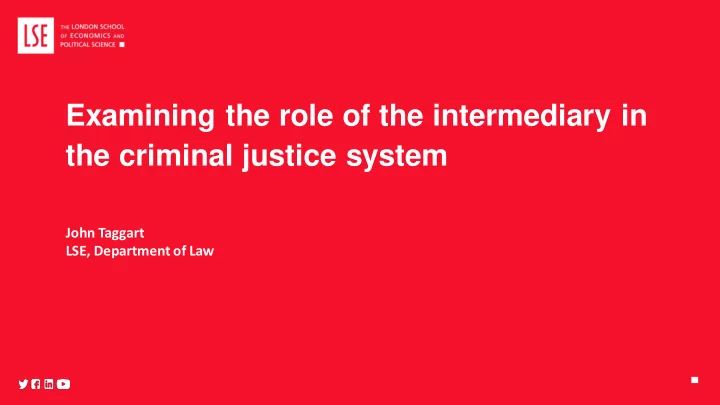

Examining the role of the intermediary in the criminal justice system John Taggart LSE, Department of Law
Who is the interm rmedia iary ry? - Youth Justice and Criminal Evidence Act 1999, s.29 (2)The function of an intermediary is to communicate — (a)to the witness, questions put to the witness, and (b)to any person asking such questions, the answers given by the witness in reply to them, and to explain such questions or answers so far as necessary to enable them to be understood by the witness or person in question. - Intermediary as a ‘facilitator’ who is involved in ‘advising the police and courts…how better to communicate with the witness’ (Penny Cooper and David Wurtzel , ‘Better the second time around? Department of Justice Registered Intermediaries Schemes and lessons from England and Wales’ (2014) 65(1) NILQ 39, 44 )
What about defendants? - Coroners and Justice Act 2009, s.104 The accused should be able to “participate effectively in the proceedings” - ‘ The court may direct the appointment of an intermediary to assist a defendant in reliance on its inherent powers’ ( Criminal Practice Directions 2015. 3F.12 ) . - ‘The right of an accused to effective participation in his or her criminal trial generally includes, inter alia , not only the right to be present, but also to hear and follow the proceedings.’ ( Stanford v. the United Kingdom , judgment of 23 February 1994, Series A no. 282-A, pp. 10-11, § 26 )
Q- How do intermediaries assist participation? Image: Hurd Rolland Partnership
1) ‘Facilitating communication’ -a broad ad, mall lleable le term rm? ‘ Intermediaries facilitate communication with witnesses and defendants who have communication needs. Their primary function is to improve the quality of evidence and aid understanding between the court, the advocates and the witness or defendant .’ ( Criminal Practice Directions 2015, 3F.1 ) ‘The primary responsibility of the Registered Intermediary is to enable complete, coherent and accurate communication to take place between the witness and the police or court .’ (Registered Intermediary Procedural Guidance, 2019, p.7)
- “People think the role is just about communication. It’s not, there is so much more to it…my argument is ‘well, hang on, how can the witness communicate if she is stuck in the carpark?...How is that going to work?...So yes, absolutely it’s our role to get stuck in.” (RI -19) - “I see my role as being to keep them informed and to ease their anxiety and to shut them up from talking about their evidence (RI-2)
2) Durat atio ion of appoin intment SC v UK (2005): Defendant need not understand every point of law or evidential detail given the right to legal advice. Stanford v UK (1994): Participation by ‘proxy’ to be sufficient so long as the defendant can instruct and adequately communicate with their legal representative.
- “We are not paid to sit for 2 weeks and quite frankly I am not of the view that it’s the best use of our time…the solicitor is able to update his client as to what’s happening…paying me to sit in a witness box day after day after day is highly questionable.” [NI-2] - “In the ideal world, they should have us with them from suspect interview, right through the trial I think they have a right to understand what is happening, what is being said about them, what all the legal jargon is in the way any of us would.” [RI-7]
Concluding thoughts… 1. ‘Participation’ is context dependent and highly individualised. 2. When appointed, intermediaries are uniquely placed to conceptualise ‘communication’ and ‘participation’. 3. Can we better equip intermediaries to enable participation?
Recommend
More recommend